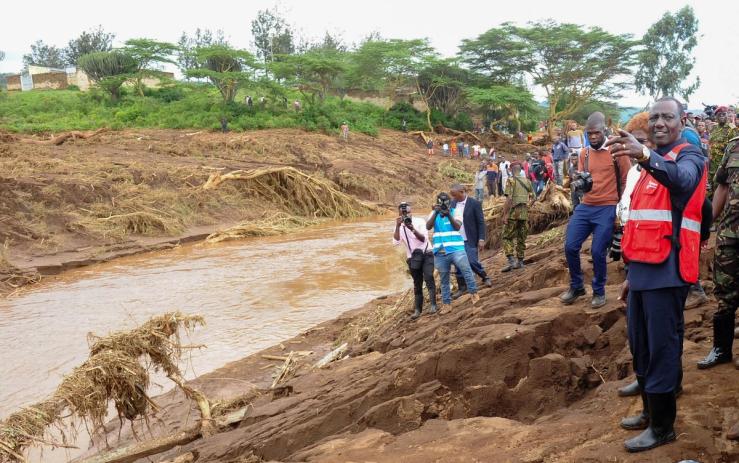The News
NAIROBI — Kenya’s president faces mounting criticism over his handling of the country’s worst floods in three decades, even as his government steps up its response to the devastation and subsequent political fallout.
President William Ruto, reacting to flooding in several parts of the country that has killed more than 150 people and displaced over 150,000, is under growing pressure to declare the situation a national disaster. It follows criticism over the speed of the government’s response and its preparedness.
Those calling for the declaration of a national disaster hope to trigger a more efficient government response to the needs of victims nationwide, particularly with the country’s meteorological agency forecasting further heavy rains in the coming days.
Flooding has damaged transport infrastructure including roads and bridges, cutting off access to several areas. First responders, institutions, and political leaders are among those who have appealed to Ruto to declare a disaster. That would enable the channeling of more resources towards rescue and recovery efforts and an assessment of damage to key infrastructure including roads, bridges and railway lines.
But Ruto has expressed reluctance to declare a disaster, telling the BBC that providing resources for affected areas was the more “urgent priority.” Speaking during Labour Day celebrations in Nairobi on May 1, Ruto said the government would prioritize moving those in the city’s badly hit informal settlements into new housing units currently being built under his administration’s controversial affordable housing programme.
“The government has been talking big on climate change, yet when the menace comes in full force, we have been caught unprepared,” opposition leader Raila Odinga said on Tuesday, questioning why contingency plans were not put in place after the Meteorological Department offered early warnings of potential flooding in at least seven regions in the country.
In this article:
Know More
The Institute of Surveyors of Kenya (ISK) is among the groups calling for a disaster to be declared. It attributed the floods to factors including the disregard of planning and zoning regulations by property developers, resulting in blocking of waterways.
The association called for measures to prepare for the impact of climate change, including a review of zoning policies and aerial mapping of affected areas. “We must proactively respond to this crisis with comprehensive measures, understanding that the likelihood of future, possibly more severe, flooding events cannot be ignored,” said ISK President Eric Nyadimo.
Nearly two weeks since the flooding started, the military on Wednesday, May 1 began arriving in various affected areas to support rescue and recovery efforts following a directive from Ruto. The central Kenya town of Maai Mahiu, where 70 people died in landslides earlier this week, is among areas in which the military has been deployed.
Martin’s view
The response of government agencies in areas affected by the flooding has been slow and inadequate in many cases.
“Many people here who are now displaced still don’t have anywhere to go, some don’t even have food,” Joseph Ndung’u, a resident of Mathare, Nairobi, told Semafor Africa. He questioned the government’s efforts. “It is us (in the community) that have been helping each other.”
Many residents of Mathare, an informal settlement, had to sleep on their roofs and now find themselves displaced. Community-based organizations, aid organizations such as the Red Cross, and residents within affected communities have played a major role in supporting the victims so far — filling the gaps where government agencies have been absent.
The engagement of the military is expected to offer response efforts a boost. It is, however, also important to find long-term solutions including the review and enforcement of planning and zoning regulations, which developers often get around by paying bribes to government officials at different levels.
The View From Tanzania
Devastating heavy rains and flooding has also been experienced in the East African nations of Tanzania and Burundi. The death toll from the flooding in Tanzania currently stands at 155.
Prime Minister Kassim Majaliwa told Parliament on April 25 that over 200,000 people and around 50,000 households had been affected by rains and flooding since January.
Warning of continued rain, he advised people in affected areas to begin moving to higher ground.


